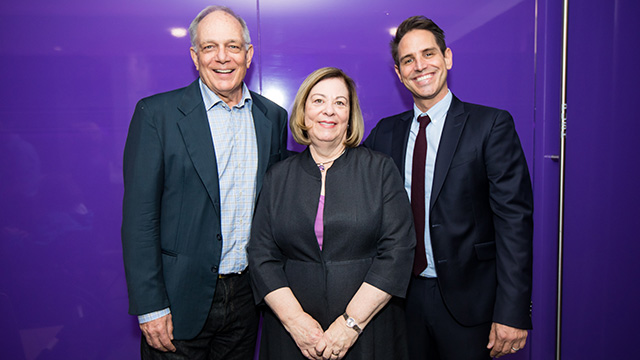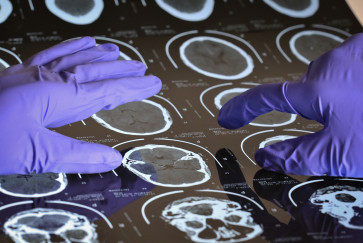A new dramatic writing professorship at the Northwestern University School of Communication will significantly expand course offerings and teaching opportunities, thanks to a $2 million gift from the Berlanti Family Foundation. The new Barbara Berlanti Professorship in Writing for the Screen and Stage marks the foundation’s largest philanthropic commitment to any organization to date.
Greg Berlanti is a writer, producer and director of television and film and a 1994 graduate of the School of Communication. He and his husband, Robbie Rogers, established the Berlanti Family Foundation to improve the lives of all LGBTQIA people and their straight allies through education, the arts, medicine and other social services. In addition to the professorship, the foundation has supported such efforts as GLSEN, which creates safe education environments for LGBTQIA youth; F*ck Cancer, which is dedicated to prevention, early detection and providing emotional support and guidance to those affected by cancer; and the National Immigration Law Center, whose mission is to defend and advance the rights and opportunities of low-income immigrants and their families.
The gift to the School of Communication will create the Barbara Berlanti Professorship in Writing for the Screen and Stage, named in honor of Berlanti’s mother, who passed away in 2017. The gift also commemorates Berlanti’s 25th reunion year and counts toward We Will. The Campaign for Northwestern.
“My mom, Barbara Berlanti, was a lifelong champion of the arts and my greatest advocate and patron,” said Berlanti. “She placed an old typewriter in front of me at 10 years old and told me to start writing all the stories that were in my head—instead of just talking her ear off—and I haven’t stopped since. Our family is so proud to have a professorship in her name dedicated to helping Northwestern continue its great legacy of fostering the next generation of humane, diverse, courageous and bold storytellers.”
The endowed professorship will build on the success of the school’s signature writing programs by increasing teaching capacity and bolstering a curriculum that prepares students to work across media and genres—and encourages them to engage and create work by and for diverse, global audiences. The professorship will be housed in the School’s Department of Radio/Television/Film (RTVF), which offers robust writing curricula for graduate (MFA in Writing for Screen and Stage) and undergraduate students (through modules in Creative Writing for the Media, Playwriting, Comedy Arts and more). Berlanti previously endowed Northwestern’s playwriting program. The new professorship will result in further expansion of this programming and of its screenwriting counterpart.
“Northwestern is determined to be at the forefront in finding and developing new voices and helping them tell their stories,” said Barbara O’Keefe, dean of the School of Communication. “To do that, we must build a faculty that reflects and respects diversity. Thanks to Greg, Robbie and the Berlanti Family Foundation, the new Barbara Berlanti Professorship will play a major role in helping us attract leading artist-educators to our faculty who can, in turn, recruit and nurture students from underrepresented and under-supported groups and help transform the creative industries.”
The professorship was supported in part by alumni Patrick G. ’59, ’09 H and Shirley W. Ryan ’61, ’19 H (’97, ’00 P) through the Ryan Family Chair Challenge, which matches gifts made by other Northwestern supporters to establish new endowed professorships or chairs.
Los Angeles-based Berlanti made Hollywood history last May when a record 18 television shows of his were ordered for the 2019 calendar year. Berlanti, through Berlanti Productions, is the force behind such series as “The Flash,” “Riverdale,” “Brothers & Sisters,” “Dawson’s Creek” and “Black Lightning.” He has multiple film credits to his name, including directing 2018’s “Love, Simon,” the first gay teen romance backed by a major Hollywood studio.
The School of Communication welcomed Berlanti back to campus in June to address the graduating students as the 2019 convocation speaker. In a heartfelt and funny address, Berlanti detailed his wishes for the students and shared with them the story of his transformational college experience.
“Northwestern was the first period in my life I would repeat,” he told the group. “I would do it all over again.”
A large part of that experience, Berlanti explained, involved examining and identifying his homosexuality, an agonizing process made better by Northwestern friends and faculty who supported him, a high-achieving interdisciplinary studies major from Rye, New York. His coming out, followed by marriage and fatherhood, informed the mission of the Berlanti Family Foundation and its tenets of inclusion and empowerment of intersectional scholars and artists.
“This is important in writing and RTVF because of the way that media, from film to television to new media platforms, so often ends up simply rehearsing and reinforcing the everyday assumptions of the dominant, status quo around racial, gender, sexual and class privilege when marginalized and minority voices are not at the table in significant numbers,” said Miriam Petty, associate professor and director of the doctoral program in screen cultures. “Given Northwestern’s significance as an institution that trains media makers and content producers through RTVF, we have an opportunity to be agents of change, especially in the era of online social activism, but only if we lean into the intentional transformation of our own hiring, mentorship, writing and teaching practices.”
The Northwestern University School of Communication seeks to advance the arts, sciences and practices of human communication through every appropriate means, and especially through education, scholarship, artistic work, policy analysis and advocacy. In pursuit of this mission, the School has developed innovative curricula for undergraduate, professional and doctoral programs in each of its five departments (communication sciences and disorders, communication studies, radio/television/film, performance studies and theatre).
The funds raised through the “We Will” Campaign are helping realize the transformational vision set forth in Northwestern’s strategic plan and solidifying the University’s position among the world’s leading research universities. More information on We Will. The Campaign for Northwestern is available at wewill.northwestern.edu.


